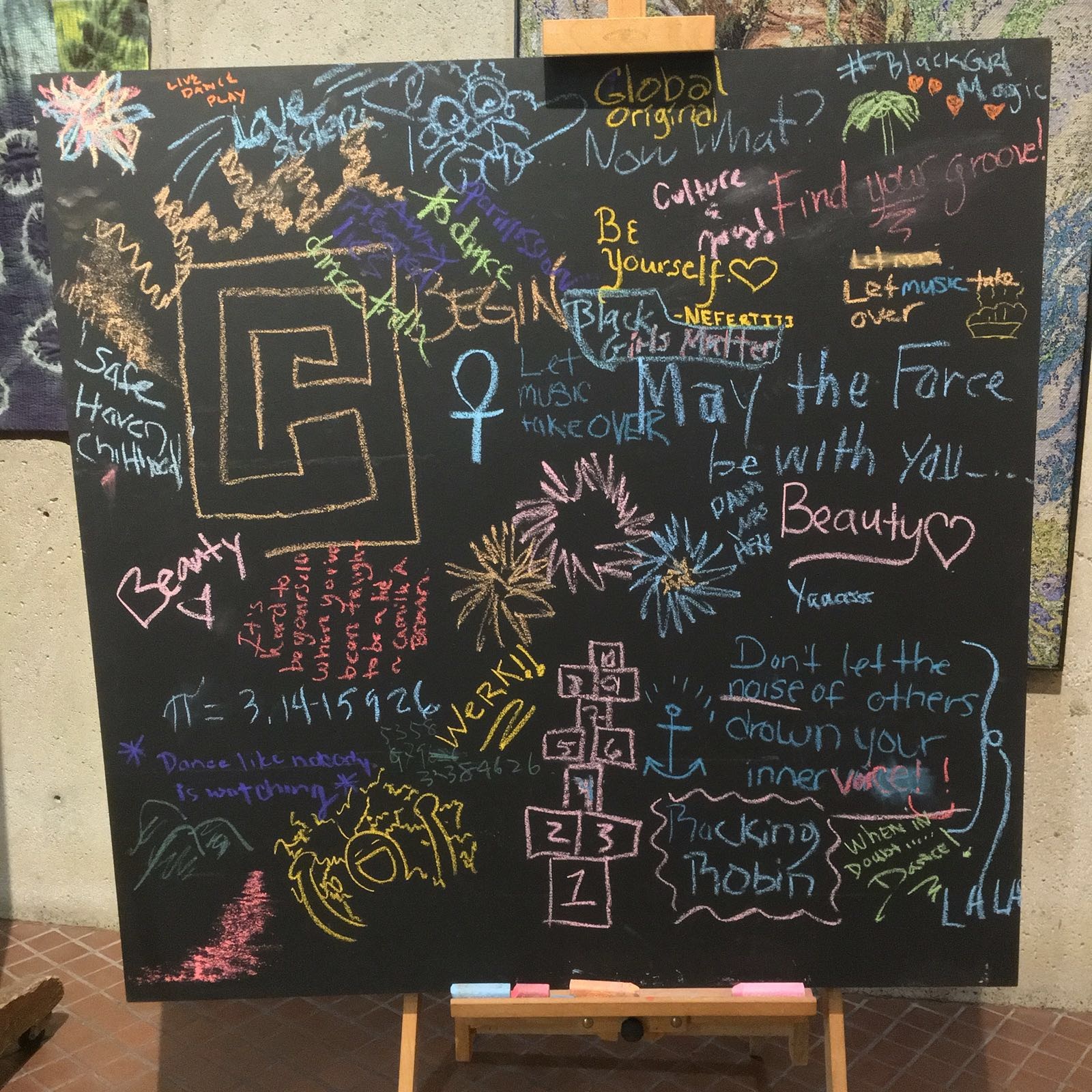BLACK GIRL: Linguistic Play
World Premiere: September 22, 2015 - The Joyce Theater
Nominated For a 2016 Bessie Award for Outstanding Production!
"Who was I before the world defined me?" Celebrated choreographer Camille A. Brown shines a spotlight on sisterly love, unfurling the joys and complexities of Black girlhood. Across three dynamic duets, the rhythmic play of schoolyard games and adolescent feuds gives way to nurturing friendships forged in common struggle. Through live music and a mix of modern and ancestral African-American movement traditions—stepping, double dutch, Juba, ring shout— BLACK GIRL: Linguistic Play evokes memories of self-discovery and resonates with the humanity of young women whose experiences deserve to be danced.
Click here to download the BLACK GIRL Reference & Resource Guide PDF
CREATIVE TEAM
COMPOSERS: Scott Patterson (pianist) & Tracy Wormworth (electric bassist)
DRAMATURGS: Daniel Banks, Kamilah Forbes and Talvin Wilks
LIGHTING DESIGN: Burke Wilmore
SOUND DESIGNER: Sam Crawford
SET DESIGN: Elizabeth C. Nelson
COSTUME DESIGN CONTRIBUTORS: Zulema Griffin, Carolyn Meckha Cherry, Mayte Natalio and Catherine Foster
CULTURAL ANTHROPOLOGIST: Aimee Cox
TAP COACHES: Shaune Johnson and Marshall Davis
SPECIAL THANKS
The creation and presentation of BLACK GIRL: Linguistic Play is supported by the New England Foundation for the Arts’ National Dance Project with lead funding provided by The Doris Duke Charitable Foundation and the Andrew W. Mellon Foundation, with additional support from the Community Connections Fund of the MetLife Foundation and the National Endowment for the Arts. Major support for this new work also comes from the MAP Fund, primarily supported by the Doris Duke Charitable Foundation with additional funds from The Andrew W. Mellon Foundation; Engaging Dance Audiences administered by Dance/USA and made possible with generous funding from the Doris Duke Charitable Foundation; a Jerome Foundation 50th Anniversary Grant; New York State Council on the Arts with the support of Governor Andrew Cuomo and the New York State Legislature; Harkness Foundation for Dance; and a 2014 New York City Center Choreography Fellowship.
This work was commissioned by DANCECleveland through a 2014 Joyce Award from the Joyce Foundation, The Clarice Smith Performing Arts Center at The University of Maryland, Juniata Presents and Juniata College. It was developed, in part, during a residency at Baryshnikov Arts Center, New York, NY awarded through the Princess Grace Foundation–USA Works in Progress residency program; a creative residency at The Yard, The Flynn Center and the Wesleyan Center for the Arts; a technical residency at Juniata College in Huntington, PA; a residency at New York City Center; and a residency at Newcomb Dance Program, Tulane University Department of Theatre and Dance.
In 2015, we were honored to have “The Dialogue” moderated by Aimee Cox and Theresa Ruth Howard.
CHOREOGRAPHER’S NOTE
BLACK GIRL: Linguistic Play celebrates the unspoken rhythm and language that Black girls have through Double Dutch, social dances, and hand-clapping games that are contemporary and ancestral. As I began to create the work, I realized that I was exhausted by stereotypes and tropes because, as a Black female director, I battle with them daily. Kyra Gaunt’s book, The Games Black Girls Play, inspired the concept for the work. The word “play” immediately shot out. I started thinking about my childhood and the many games I used to play—Double Dutch, Red light, Green light, Marco Polo—and how it was hard for me to find narratives within the media that showcased Black girls being just that: girls. This instantly resonated and became personal. Who was I before the world defined me? What are the unspoken languages within Black girl culture that are multi-dimensional and have been appropriated and compartmentalized by others? What are the dimensions of Black girl joy that cannot be boxed into a smile or a grimace, but demonstrated in a head tilt, lip smack, hand gesture, and more?
BLACK GIRL: Linguistic Play showcases and elevates the rhythms and gestures of childhood play, highlights the musical complexity and composition, and claims them as art. It shows the power of sisterhood and the fact that, as we mature, Black girls still play. It is remembering, conjuring, honoring, and healing. It’s a Black girl’s story through her gaze. This work is a gift to myself and Black girls everywhere.
If our audiences see parts of themselves in our work—their struggles and their joys—regardless of their color, gender, or socioeconomic background, then I know we have done our job.
Let’s play!
ARTICLES
“stunningly impactful TITAS debut” Read Full Article
— Cheryl Callon, TheaterJones
“Clever and tender… Ms. Brown, in other words, has put the black girl on a pedestal.” Read Full Article
— Gia Kourlas, The New York Times
“Arguably the best thing that has ever happened on, and to, the Joyce stage.” Read Full Article
— Eva Yaa Asantewaa, Time Out New York
“BLACK GIRL: Linguistic Play…is what it feels like to have yourself handed back to you, to be honored with the gift of your contradictory, hard won, still in process, beautifully flawed, inimitable self.” Read Full Article
— Aimee M. Cox, The Feminist Wire
“It was the first time that I could see the beauty of my culture honored and respected, to see the artistry, the elegance, ingenuity… the ‘genius’ in Black girl.” Read Full Article
— Theresa Ruth Howard, My Body My Image
“If Black Girl’s power comes from its specificity, its nostalgia comes from its universality.” Read Full Article
— Lauren Wingenroth, DanceTabs
“…one of the most powerful representations of Black girlhood I have ever witnessed. Brown created a moving masterpiece that was a narrative of Black adolescence never conceptualized before.” Read Full Article
— Christina Greer, PH.D, Amsterdam News
“It’s relevant, it’s honest, it’s vulnerable, and by the sheer number of audience members who not only remained in their seats for the following dialogue with the company, but also participated—it’s impactful.” Read Full Article
— Jenny Thompson, Eye on the Arts
“A dance declaration” Read Full Article
— Walter Rutledge, Out & About NYC Magazine
“This is powerful stuff, with dance as the hammer of affirmation, not of self but of sisterhood.”
— David White, Artistic & Executive Director at The Yard
“Camille Brown’s performance expanded the constraints of dance… we need works like Brown’s. We do not live in a post-racial, post-gender society, and the scars left by our history continue to shape our thoughts.” Read Full Article
— The Williams Record
“Black Girl might be dance in its most humanistic form: the embodiment and questioning of cultural norms that manifest in muscular holding, posture, gesture, and breath.” Read Full Article
— Nicole Bindler, Thinking Dance
“So brave. Not only was Brown opening up her work for anybody’s interpretation and critique, she was opening up her life. She was proving, to all in attendance, that #blacklivesmatter.” Read Full Article
— Becca Weber, Thinking Dance
More:
‘Black Girl’ at Berkeley full of play and great dance, SF Gate
Dance fights stereotypes, San Francisco Chronicle
Camille A. Brown & Dancers trip the childhood fantastic, Repeat Performances
Black Girlhood Through Black Girls’ Eyes: A Chat With Camille A. Brown, KQED Arts
Camille A. Brown & Dancers BLACK GIRL: Linguistic Play, For All Events
Camille A. Brown’s BLACK GIRL: Linguistic Play Has Bay-Area Premiere, San Francisco Classical Voice
Unleashing the Rhythms of Childhood, Point of Contact
Reflecting on the Black girl experience, Trinidad & Tobago Guardian
BWW Review: A Powerful Evening with CAMILLE A. BROWN & DANCERS, BWW Dance World
Getting to See Camille A. Brown’s Opening Night at The Joyce, Dance Teacher
DANCECleveland, collaborator are 2014 Joyce Awards recipients, Dance Cleveland




